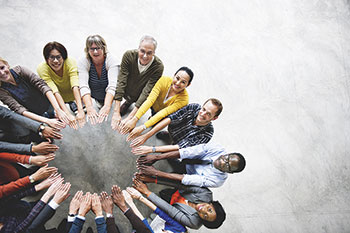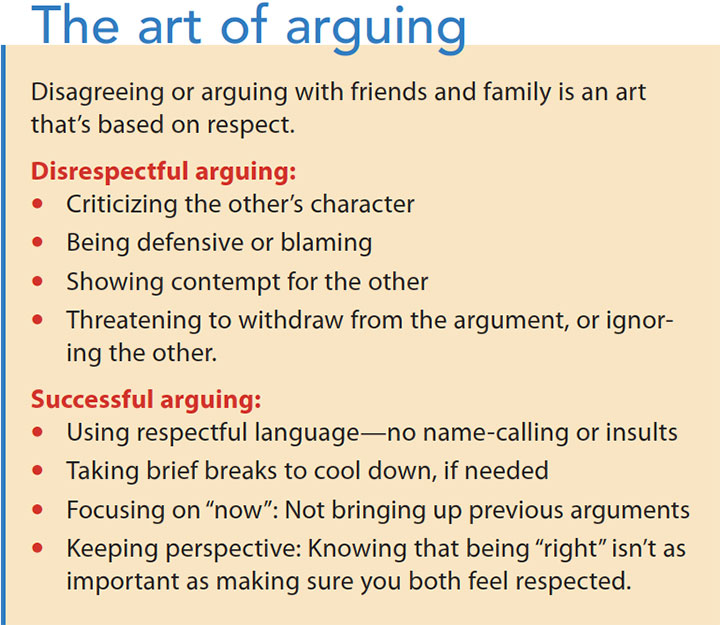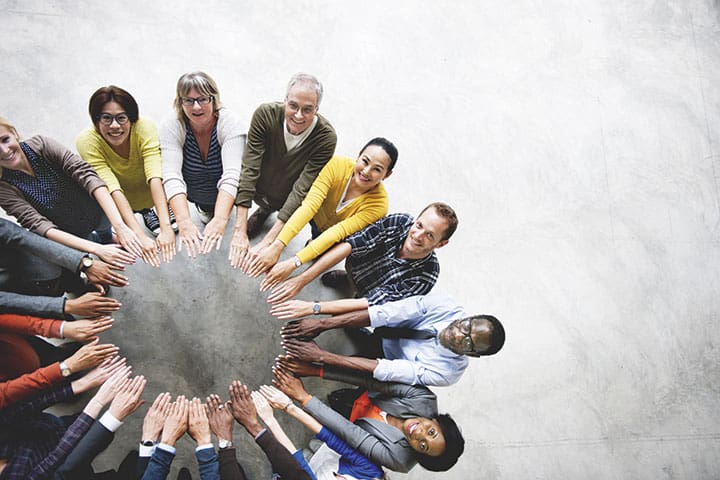Friends and family are critical to your quality of life.
Takeaways:
- Social well-being can be defined as our ability to effectively interact with people around us and to create a support system that includes family and friends.
- Social isolation, or being alone, doesn’t always mean loneliness.
- Steps to improving social wellness include disconnecting from technology, improving communication skills, evaluating emotional intelligence.
By Bernadette Mazurek Melnyk, PhD, RN, CRNP, FAANP, FNAP, FAAN, and Susan Neale, MFA
This is the seventh installment in a series of articles on wellness. You can read the earlier articles at myamericannurse.com/category/wellness101/.
Nurses know the transformative power of social connection; we’ve seen patients light up when friends visit or find the will to live when a loved one holds their hand. We know the gratification of sharing kind words, listening to someone’s story, giving a patient what might be the only smile he or she sees that day. It’s one of the great rewards of the job. However, we might not be getting the same support ourselves. Many of us work long shifts alone or drive to home healthcare sites where there’s no support team. And our work hours may not be conducive to keeping our relationships healthy.
If you’ve been letting your relationships slide or feel lonely and isolated, please stop and take time to reinforce this critical part of your well-being. It’s vital for both your quality of life and your health.
What is social wellness?
 Social well-being can be defined as our ability to effectively interact with people around us and to create a support system that includes family and friends. It fosters connection with others and contributes to a sense of belonging, which is important for optimal wellness.
Social well-being can be defined as our ability to effectively interact with people around us and to create a support system that includes family and friends. It fosters connection with others and contributes to a sense of belonging, which is important for optimal wellness.
Just as some people are born with great physical health, others seem naturally fortunate to have a big family and many friends. But what if your social connections are limited? Can you still be socially well if you have only a few relatives or just moved to a new city or worksite and don’t know anyone? Yes, you can, because social wellness is all about developing skills that will help you relate to others in a healthy and meaningful way.
If you’re feeling socially disconnected, you can learn ways to improve the relationships you have, build your support network, and make new connections. And if you have a large social circle, there’s a lot to learn about, too. Conflict management, setting boundaries, communication skills, assertiveness, respect for others, and the ability to balance your time between social and personal needs are all part of maintaining healthy relationships. In other words, much of social wellness is learned behavior, and we can all improve on these skills to foster our social well-being.
How important is social wellness to our lives and overall health? Some see it as a life-giving connection. “We can’t underestimate the power that we have as individuals to provide the support that people need,” said former United States Surgeon General Vivek Murthy. Concerned about the opioid crisis, Murthy met with many affected people and was impressed by how often they stressed the importance of social connection. Many individuals in recovery told him they would not have made it without the support of others, even if just one person had given them support. Social support, says Murthy, can “provide that transition from a place of pain to a place of possibility.”
What is loneliness?
Social isolation, or being alone, doesn’t always mean loneliness. In fact, some people who are surrounded by family and friends feel lonely; others who live and work alone don’t feel lonely at all. Psychology researchers Julianne Holt-Lunstad and Timothy B. Smith from Brigham Young University, who studied the links of loneliness and social isolation to cardiovascular disease, define loneliness as “the discrepancy between one’s desired and actual level of social connection.” That means that if being alone doesn’t bother us, we aren’t lonely; only when we notice the lack of social connection do we feel the stress of loneliness. However, feelings of loneliness are very real. The health risks associated with loneliness are real, too. Holt-Lunstad and Smith found that social isolation and loneliness increased risk of death by up to 30% and calculated it as a greater risk than smoking or obesity.
Although all of us feel lonely at times, this emotional state has been misunderstood. Lonely people have been characterized as antisocial loners, lacking in social skills. Not wanting to be blamed for their loneliness, many people resist admitting to it, even to themselves. According to University of Chicago social neuroscientist John Cacioppo, PhD, that’s dangerous. Brain image studies show that loneliness puts the brain into a survival-mode state of hypervigilance, and the negative effects include increased cortisol levels, impulsive responses, and fitful sleep. Cacioppo urges people to respond to feeling isolated or other signs of loneliness as they would to other biological indicators, such as hunger, thirst, or pain. In his book, Loneliness: Human Nature and the Need for Social Connection, Cacioppo explores a psychological component of loneliness that may have dramatic implications for overall health: Studies show that lonely people have more trouble with self-control. Therefore, someone feeling lonely is far more likely to overeat, eat unhealthy foods, or engage in other unhealthy behaviors to feel better.
Studies on the impact of loneliness on physical health are alarming. Loneliness has been found to cause inflammation and raise stress hormone levels, which can increase the risk of heart disease, arthritis, type 2 diabetes, and dementia, according to Lisa Jaremka, PhD, of the University of Delaware. Jaremka also found that people who are lonely may have suppressed immune systems, brought on by stress. A study by Holwerda and colleagues found that loneliness was a risk factor for dementia.
How can you improve your social wellness?
Although the implications of loneliness are disheartening, you can take steps to improve your social wellness. Here are a few ways to enhance your relationships with others and connect to new people:
- Disconnect to connect. Although technology has many positives, it also can be a barrier to connecting with others at home and work. Make it a regular routine to disconnect from technology every day to spend time in face-to-face communication with family members and professional colleagues. This video illustrates the point.
- Improve your communication skills. Communicate in person whenever possible. Learn to use “I” statements, such as “I need to talk to you,” instead of “you” statements such as, “You don’t listen.” Consider taking a class in communication skills if you believe yours need some improvement.
- Connect with your community. Volunteering can give you a sense of self-worth and connect you to other people. Or consider joining a local group focused on an activity you enjoy, such as singing or knitting, or one that you’d like to learn more about. If you’re strapped for time, you can follow local community volunteer groups on social media and ask if you can join in now and then. Seeing someone’s Instagram post of tulips blooming in spring that you helped to plant last fall can help you feel socially connected.
- Be positive. When you have a positive outlook, other people will enjoy being with you—and you’ll enjoy yourself. Put disappointments, complaints, and worries aside for a while and enjoy the present.
- Evaluate your emotional intelligence. Are you sensitive to others’ emotions? If not, you may be missing signals they’re giving you about what they need from you as a friend or family member. Take an interpersonal skills test to find out areas where you can improve. You can access a free interpersonal skills test.
- Celebrate and compliment your family and friends. Take time to bolster your family members and friends with a call or visit. Don’t wait for birthdays to celebrate; it’s always a good time to send a card or connect in person. Make a regular habit of complimenting and thanking people when it’s deserved. The book How to Win Friends and Influence People by Dale Carnegie has some great suggestions.
- Smile and learn people’s names. There is great value in smiling and remembering people by their first name. Dale Carnegie once said, “A person’s name is to him or her the sweetest and most important sound in any language.” When you use someone’s name, you show respect and attention to what matters to them. Don’t be afraid to ask someone with a difficult-sounding name how to pronounce it.
- Improve time management. When you arrive on time, you show that you respect and value others. Don’t keep people waiting. If you get to work 15 minutes ahead of time, you’ll feel less flustered and you may have a minute to share a smile with a coworker, which can bolster you for the day ahead.
- Build a culture of respect. When you model respect for others who may be different from you, you gain respect in return.
- Make an action plan. When you make a plan to connect with others and put it in your calendar, you’re more likely to follow through. Don’t just wait for it to happen; you can be proactive about your social wellness.
- Respect your partner. Studies show that successful couples name respect as the most important part of their relationship, valuing it even higher than communication. If you’re married or in a committed relationship, show your partner loving respect.
- Learn to disagree, or argue in a positive, constructive way. Psychologist John Gottman, PhD, who was the executive director of the Relationship Research Institute, points out that most couples argue from time to time, as do friends and coworkers, and that’s not necessarily bad. The important thing is to know the right way to argue. Relationships can thrive when people know how to successfully deal with conflict. (See The art of arguing.)

Give the gift of wellness
When you strengthen your social wellness, you strengthen others’ social wellness, too. That’s a great gift of health and wellness for all of your family and friends, and the friends you have yet to meet!
The authors work at The Ohio State University in Columbus, Ohio. Bernadette Mazurek Melnyk is the vice president for health promotion, university chief wellness officer, dean and professor in the College of Nursing, and professor of pediatrics and psychiatry in the College of Medicine. Susan Neale is senior writer/editor of marketing and communications in the College of Nursing.
Selected references
Brody JE. Shaking off loneliness. The New York Times. May 13, 2013.
Cacioppo J. The lethality of loneliness. TEDx. August 8, 2015.
Cacioppo JT, Patrick W. Loneliness: Human Nature and the Need for Social Connection. New York: W.W. Norton & Company; 2008.
Holt-Lunstad J, Smith TB. Loneliness and social isolation as risk factors for CVD: Implications for evidence-based patient care and scientific inquiry. Heart. 2016;102(13):987-9.
Holwerda TJ, Deeg DJH, Beekman ATF, et al. Feelings of loneliness, but not social isolation, predict dementia onset: Results from the Amsterdam Study of the Elderly (AMSTEL). J Neurol Neurosurg Psychiatry. 2014;85:135-42.
ant7-Social Wellness-622


















